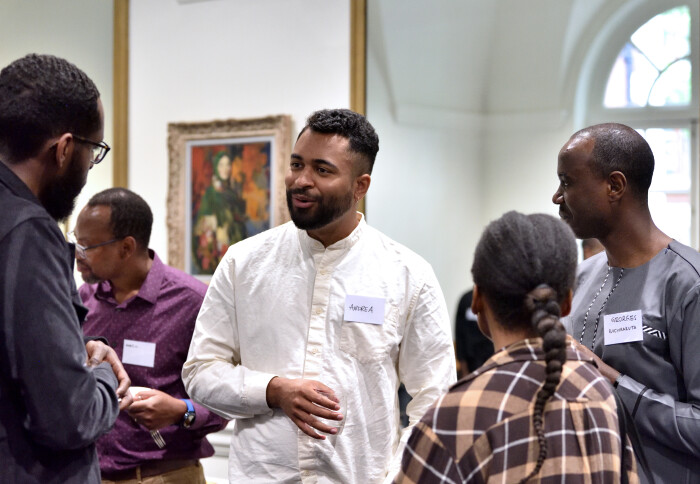Imperial joins inaugural Royal Society fellowship for Black-heritage researchers
by Jacklin Kwan

A research symposium organised by the Black Postdoctoral Network at Imperial College London.
The Royal Society Career Development Fellowship is a new initiative designed to support early career researchers from Black-heritage backgrounds.
This four-year fellowship provides recipients with the funding and mentorship necessary to establish their research careers in the UK.
The scheme was developed with significant input from Dr Mark Richards, Senior Teaching Fellow at the Department of Physics and a member of the Royal Society’s Diversity and Inclusion Committee.
At Imperial, the fellowship was awarded to Dr Timmy Delage and Dr Nsikan Nsek. Dr Delage will join the Department of Physics’ Astrophysics Group, where he will work on simulating early-stage planet formation, and Dr Nsek will continue his work on the impact of aging on cancer development at the MRC Laboratory of Medical Sciences.
Addressing the leaky pipeline

With access to a significant dataset drawn from 10 years of their grant-making activities as well as data from university staff demographics, Dr Richards and the Royal Society identified stark differences in the outcomes of Black researchers in STEM fields.
Data showed that there was low representation of Black, Asian and multi-ethnic groups amongst applicants to early career fellowship schemes, with little to no representation of Black postdoctoral researchers.
"We wanted to provide targeted support during those crucial early stages of Black researchers’ careers." Dr Mark Richards Department of Physics
This fellowship aims to address that systemic underrepresentation. “A fellowship is a key juncture in the academic pipeline,” said Professor Mark Richards, “We wanted to provide targeted support during those crucial early stages of Black researchers’ careers.”
Over their 4-year fellowship, applicants can apply for up to £690,000 to contribute to their salary, research expenses as well as relocation and visa costs for themselves and their dependants.
The scheme also includes tailored training, mentoring and engagement by Royal Society members as well as by Black British Professionals in STEM (BBSTEM). The goal is not only to support applicants’ career development but also to develop a cohort of Black researchers whose presence will naturally advocate for the community more widely.
Inaugural cohort of Career Development Fellows

Dr Delage, originally from France, completed his Master’s in Physics at Imperial before pursuing a PhD at the Max Planck Institute for Astronomy in Germany. His supervisors at Imperial included Dr James Owen and Dr Subhanjoy Mohanty from the Department of Physics, who supported Dr Delage’s fellowship application.
“We remember Timmy being an excellent researcher from his days as a MSc student in the group, and have stayed in touch during his PhD in Heidelberg and had him visit several times to talk about his work,” Dr James Owen said, “When we found out about the new fellowship, we thought it would be an excellent match to Timmy's aspirations and reached out to encourage him to apply.”
In addition to continuing his own research, Dr Delage plans on supporting other early-career researchers, particularly those from underrepresented backgrounds.
“As a person who had the great support from people who pushed and supported me at Imperial when I was younger, I’d like the chance to do the same for other people,” Dr Delage said.
Dr Nsek from the Faculty of Medicine will study cancer development in Drosophila models, focusing on how aging impacts tumour growth and development.
Following his Master’s studies at the University of Kent, Dr Nsek worked as a research assistant at the University of Plymouth, where he developed an expertise in brain cancer, specifically glioblastomas, and was offered a PhD opportunity. Upon completing his PhD, he then joined the MRC Laboratory of Medical Sciences at Imperial.
"Everyone in the scientific field has a role in contributing to the public understanding of science." Dr Nsikan Nsek MRC Laboratory of Medical Sciences
In addition to his research, Dr Nsek is passionate about science communication, maintaining a blog where he explores complex cancer research and news for a non-expert audience. “Everyone in the scientific field has a role in contributing to the public understanding of science,” he said.
For more information about the fellowship and the application process, please visit the Royal Society’s website.
Article supporters
Article text (excluding photos or graphics) © Imperial College London.
Photos and graphics subject to third party copyright used with permission or © Imperial College London.
Reporter
Jacklin Kwan
Faculty of Natural Sciences